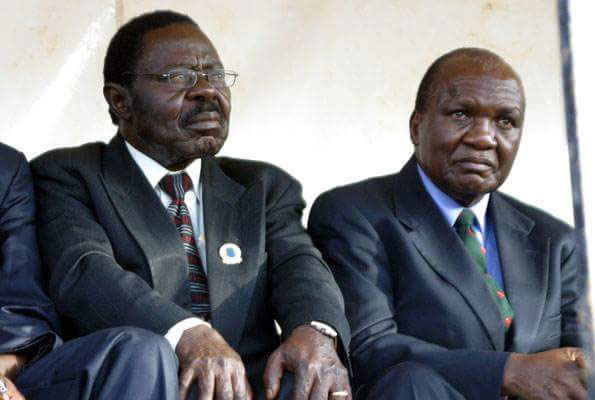
POST OBOTE POLITICS
Like many DP bigwigs including his then party boss Ssemogerere, Ssebaana was one of those offered a cabinet post after Museveni captured power in 1986 serving as a minister in three different portfolios between 1986 and 1991.
He served as Minister of Cooperatives and Marketing, Minister of Regional Cooperation and Minister of Housing and Urban Development.
In an interview, Ssebaana said in accepting to join Museveni’s government in 1986, Ssebaana believed he and Museveni stood for the same ideals, particularly the restoration of multi-partyism, democracy, respect for cultural leaders and the need to rebuild the country.
Representing Makindye East, Ssebaana was a member of the Constituent Assembly that drew up the 1995 Uganda Constitution. By the inauguration of the constitution in 1995, Ssebaana said he was already convinced Museveni would not deliver on his promises and jumped ship to manage Ssemogerere’s presidential campaign in 1996.
KAMPALA MAYORSHIP
Ssebaana returned to elective politics in 1998 when former Kampala mayor Nasser Ssebaggala was jailed in the US just months into his first term. Ssebaana, who had been Ssebaggala’s campaign manager, vied for the chair and won it. He won another five years in 2001.
However his term was not without controversies. First, on many public functions when Museveni was speaking, he accused Ssebaana of being responsible for the bad state of the city. Secondly, there were also critics who say that during Ssebaana’s two terms as mayor many public plots in the city were sold off at give-away prices. Also, city markets and the Constitutional Square were controversially leased to businessman Hassan Basajjabalaba in a scandal that claimed two government ministers. Basajjabalaba was later to be awarded billions in compensation. But Ssebaana during the interview said the decisions giving away the plots and markets were taken by the Kampala City Council, not him as an individual.
On a lighter side, Ssebaana’s characteristically coarse voice did not go unnoticed by comedians with one group which made jokes mimicking him even in at functions he attended. But Ssebaana was a man who had no time for jokes and on one function he lost his cool at a function and threatened to sue the comedy group should they continue mimicking his coarse voice.
DP TURMOIL
He was the national treasurer of the Democratic Party for more than 20 years until November 2005 when he was elected Democratic Party President General from 2005 to 2010. As DP president Ssebaana had his highs and lows.
For a party predominantly for Baganda Catholics, Ssebaana boasts of two firsts.
“Being an Anglican I was the first non-Catholic to lead the party, breaking the tradition that DP leadership was the preserve of Catholics. Secondly, in early 2010 I handed over the chair to Norbert Mao, an Acholi which was also another first since all previous presidents had been Baganda,” Ssebaana said.
On the low side, his critics still hold him responsible for the continuing divisions in DP, accusing him of holding the Mbale delegates conference in early 2010 amidst calls for the party to first pursue internal reconciliation. Ssebaana’s critics say he proved indecisive when he needed to take firm stands at critical moments during the impasse that preceded the delegates’ conference.
From this disagreement, a DP faction calling itself Truth and Justice (TJ) led by present Kampala Mayor Erias Lukwago was formed. Many of the TJ leaders boycotted the Mbale meet and refused to recognize the leadership of Mao.
In the next general elections in 2011, TJ fronted its own candidates against other party candidates including the opposition and main stream DP.
The formation of TJ led to the diminishing influence of DP as a political party since TJ is not a registered political party and its members stood as independents.
But Ssebaana always insisted he rooted for the right candidate by backing Mao though DP insiders say it was Ssebaana was paying back Mao for also accepting not to challenge him when he stood for the party presidency earlier.
As DP President, Ssebaana also faced another test and that was the rise of the Dr. Kizza Besigye’s FDC which took many of DP’s leaders and supporters in its traditional bases in Central and Eastern Uganda.
“Even within DP, some forces openly supported Besigye, who because of his military background and more radical character seemed to stand a better chance of ousting Museveni,” Ssebaana explained.
But Ssebaana insisted on running for president in 2011, in the process registering the lowest ever vote harvest for the party’s presidential candidate (1.6%). As expected FDC’s Besigye was the runner up.
Outside the mainstream national politics, Ssebaana had a role in the Buganda kingdom as the chairperson of the organising committee of the Bika bya Buganda (Buganda Clans) Football Tournament. He is also said to have been a founding member of Express Football Club.
On the education side, he was also a member of the University Council of Ndejje University.
Ssebaana is survived by a widow, Christine and children.
****
 The Independent Uganda: You get the Truth we Pay the Price
The Independent Uganda: You get the Truth we Pay the Price





